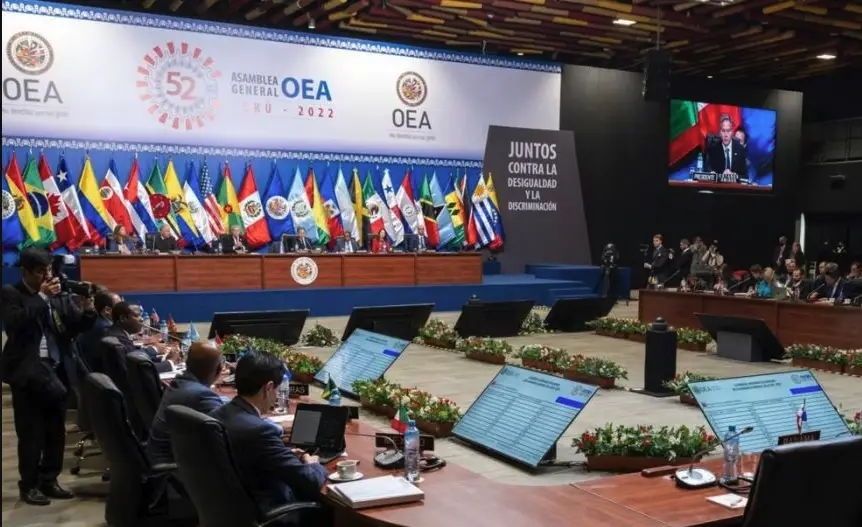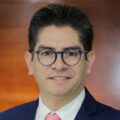Albert Ramdin has been elected by acclamation as the new Secretary General of the Organization of American States (OAS) for the 2025–2030 term. His appointment, on March 10, 2025, marks a significant shift within the organization, as he becomes the first Caribbean representative to hold the position. His arrival raises expectations regarding the direction the OAS will take at a time when it faces deep structural challenges—from democratic crises to security issues and mass migration.
Born in 1958 in Suriname, Ramdin studied social geography at the University of Amsterdam and the Vrije Universiteit Amsterdam. His diplomatic career has largely unfolded within multilateral organizations, where he has stood out for his focus on regional diplomacy and consensus building. His connection with the OAS began in 1997, when he was appointed Suriname’s permanent representative to the organization. Later, in 2001, he became political advisor to the Secretary General, giving him deep insight into the internal workings of the institution. In 2005, he was elected Assistant Secretary General, a role he held until 2015. During that period, he worked closely with José Miguel Insulza, then Secretary General of the OAS, with whom he shared the organization’s leadership at a critical moment for Latin America.
Ramdin now returns to the OAS in a far more complex context. A climate of polarization has strained dialogue with countries like Venezuela, Nicaragua, and El Salvador. The lack of consensus among member states has weakened the organization’s ability to act, and many governments have questioned its role as a mediator in regional conflicts. His main challenge will be to restore the OAS’s credibility and prove that it can be an impartial and effective body in promoting democracy and human rights.
One of the most pressing issues he will need to address is the migration crisis. More than 7.7 million Venezuelans have left their country in the last decade, making it the largest forced displacement in Latin American history. Haiti, for its part, is experiencing a political and humanitarian collapse that has forced thousands to seek refuge in other countries across the continent. The OAS will need to play a more active role in coordinating efforts to protect migrants and in seeking solutions that address the structural causes of these massive population movements.
Another key issue is the growing insecurity in the region, worsened by the expansion of organized crime and drug trafficking. Countries like Mexico, Colombia, and Ecuador are facing unprecedented levels of violence, which have undermined institutional stability and raised concerns about the future of security in Latin America. Ramdin will need to push for a regional cooperation strategy that can combat criminal activity more effectively without compromising human rights or eroding the democracies of affected nations.
Climate change also poses an urgent threat to the region, particularly for Caribbean nations, which are suffering the most from hurricanes, droughts, and floods. The OAS will need to promote sustainable development policies and facilitate access to international financing so that the most vulnerable countries can mitigate the effects of the climate crisis and adapt to new environmental challenges.
In addition to these challenges, Ramdin will have to reform the OAS’s internal structure to make it more efficient and less dependent on funding from the United States, which remains its main contributor. The organization’s financial crisis has limited its operational capacity, and although Washington continues to be a key player within the OAS, excessive dependence on its funds has created tensions with other member states.
In this context, the re-election of Donald Trump as President of the United States for the term beginning in 2025 adds a new layer of uncertainty. Back in the White House, it’s likely that the relationship between the U.S. and the OAS will be redefined. During his first term (2017–2021), Trump showed limited interest in multilateral forums, prioritizing unilateral policies and pressuring international organizations to align with his vision. In the case of the OAS, his administration used the organization as a tool to pressure Venezuela, Cuba, and Nicaragua, focusing on isolating the governments of Nicolás Maduro, Miguel Díaz-Canel, and Daniel Ortega. In contrast, it was more tolerant of other governments in the region, even those with authoritarian leanings, as long as they didn’t challenge U.S. strategic interests.
If Trump adopts a more isolationist foreign policy and cuts funding to multilateral organizations, the OAS could face new financial hurdles, forcing Ramdin to seek support from other member states or international organizations. Additionally, with Trump focusing more on migration and border security, Latin American countries will likely face increased pressure to curb migratory flows toward the U.S. This could create tensions between Washington and the OAS, especially over how to address the migration crisis through a human rights and development-based approach, rather than purely repressive measures.
On issues like Venezuela, the Trump administration may take an even harder stance, seeking to push the OAS into a more active role in delegitimizing the Maduro regime. For his part, Ramdin has emphasized the importance of dialogue and diplomacy.
Though Ramdin brings extensive experience in inter-American diplomacy, his success will depend on his ability to rebuild unity within the OAS. His leadership will need to avoid past mistakes and focus on delivering concrete solutions to the continent’s most urgent problems. His previous relationship with Insulza suggests he could adopt a more balanced and less confrontational approach—something that is essential in today’s polarized geopolitical climate. If so, it may facilitate the building of consensus within an organization marked by division.
The challenge is monumental: reposition the OAS as a relevant actor in the region, strengthen its legitimacy, and ensure it remains an effective space for dialogue and cooperation. Latin America is facing an unprecedented institutional crisis, and the need for strong and functional institutions is more urgent than ever. Albert Ramdin now faces the enormous task of proving that the OAS can reclaim its role as a key organization for defending democracy, security, and development in the hemisphere. With Trump back in office and an uncertain political landscape ahead, his leadership will be crucial in shaping the OAS’s role in the decade to come.
*Machine translation proofread by Janaína da Silva.













